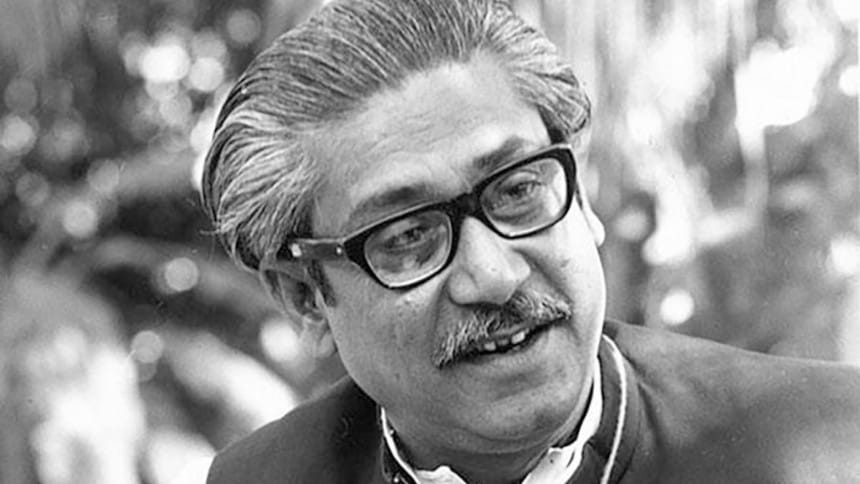Bangabandhu: A public leader extraordinaire

My reminiscences about Bangabandhu date back to the late fifties when Bangabandhu took over as a minister in charge of commerce, labour and industries in the provincial cabinet of East Pakistan. On his personal selection, I, with a stint in journalism behind, joined as his press officer. This assignment was obviously the high-water mark of my service career and beyond. I was somewhat nervous initially, but then felt reassured and comfortable when he asked me to send my copies to the news media without his vetting.
The room which he occupied was located on the first floor of the Shahbag canteen (presently known as Secretarial canteen), which was rather small for ministerial accommodations. Around his secretariat table, there were four wooden chairs without any cushion and a sofa-set that would accommodate only three persons. Visitors were few and far between. His table was never cluttered with pending files. The curtains of his one-door room and two windows were of moderate variety, as was the norm in those days. It exuded a gentleness and a quiet ambience that characterised the secretariat premises at the time.
Regretfully, his room is still unmarked and unrecorded by the secretariat authorities. Also the time that he had spent at the secretariat as a minister rarely finds mention in print or electronic media, although every phase of his career was singularly important in shaping his political thought and career. His tenure as a minister had, in fact, offered him a unique opportunity to gain first-hand knowledge of the exploitation of the Bengalis by the Pakistani rulers since Partition. It reinforced his conviction that liberation was the only option left for the Bengalis if they were to live honourably in the comity of nations.
Notably, the ministerial job was the only appointment that Bangabandhu had accepted under the Pakistani regime. But then, that was indeed the defining moment to chart his next political strategy. At times there were moments when he seemed austerely private, a loner—it was rather impossible to recognise the inner turmoil in his far-away look and the frozen melancholy of his features.
In one of his official tours to the Faridpur town, Bangabandhu asked me to accompany him during an inspection visit to the district jail. As he was going around the jail premises in brisk steps, he suddenly stopped in front of a cell, and remained standing there for some time. Later he told us that in his student days, he had been jailed for protesting the price hike of daily necessities by a West Pakistani district magistrate. I still vividly remember those moments when he seemed lost in nostalgia.
But before the year's end in office, Bangabandhu elected to opt out from the cosy club of ministerial comfort and authority and be with his hapless people to galvanise them to fight for freedom, albeit on a graduated scale, a role that he seemed to be preparing for all his life. Since then, much time elapsed, Sheikh Mujibur Rahman became Bangabandhu and the Father of the Nation, as Bangladesh emerged on the world map from a classic war of liberation in contemporary history.
In the early days of independence, we had streams of visitors from all corners of the globe. On one occasion, I, then an information officer, accompanied a venerated German writer during her visit to Bangabandhu at Dhanmondi 32. Bangabandhu received the guest at the doorstep of his residence and took her to the drawing room. The writer complimented Bangabandhu on his unique leadership in the liberation movement that won freedom for the Bengali nation. Bangabandhu was also appreciative of the support extended by her country in building our ravaged economy.
Before seeing the visitor off, much to my surprise, Bangabandhu called me by my first name. He remembered it even after so many years had elapsed. I was close to tears—it was the most unforgettable moment that remained etched in my mind. Like me, so many people have had fond memories of being pleasantly surprised when Bangabandhu called them by their first names, a gesture that showed how deeply he cared about his people.
Presently, as the nation commemorates the centenary of Bangabandhu's birth, let us recommit ourselves to fulfil his dream of Sonar Bangla. The attainment of the status as a developing nation under the leadership of Prime Minister Sheikh Hasina is a luminous tribute to his birth centenary on behalf of the nation.
Syed Badrul Haque is a contributor to The Daily Star.

 For all latest news, follow The Daily Star's Google News channel.
For all latest news, follow The Daily Star's Google News channel. 



Comments